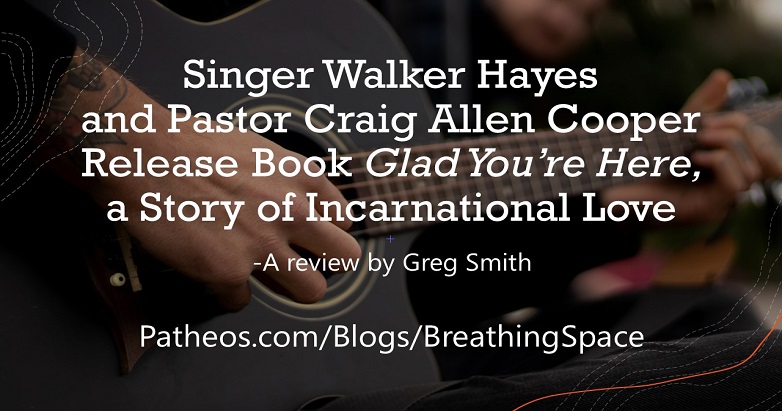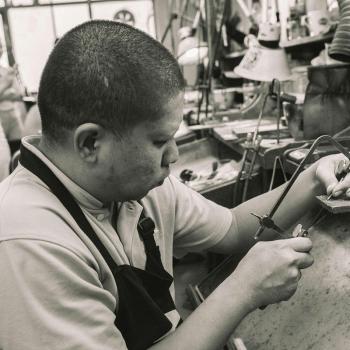Country singer Walker Hayes stepped out on a limb with “Craig,” a love song to his best friend. The artist famous for his platinum record “Fancy Like” admits it’s strange. You don’t often hear bromance songs on the radio. Craig Allen Cooper made such a difference in his life that Hayes not only wrote a song about him, but they co-authored a book together. It’s all about the salvation that friendship can bring—in a couple of ways.

A Friend
The two released their book, Glad You’re Here: Two Unlikely Friends Breaking Bread and Fences, on May 3 of this year. Hayes and Cooper trade alternately tell their version of events that led to their friendship. They talk about shattered dreams in both of their lives, leading them to meet each other in church. Hayes says at first, he resented the friendship between his wife Laney and the Coopers and didn’t understand their faith. Instead of judging the failing songwriter for his alcoholism, the associate pastor loved him through his brokenness. The two families grieved together through tragedy, shared faith together, and eventually decided to live next door to one another. This is the kind of friendship everybody yearns for. Their book celebrates the agape love they share. It’s a quick read, and well worth the purchase. It’s a bit more Evangelical than I prefer, but even this Exvangelical was moved to tears at their beautiful relationship.
An Addiction
Hayes is far from a Christian artist. While he is now a follower of Jesus, Hayes has not made a career out of Christian music. Instead, many of his country/hip hop songs are about “Country Stuff,” taking his wife to Applebee’s on a date night, “Drinking Songs,” and trying to stay out of “AA.” Now, Hayes is transparent about his alcoholism and his journey to sobriety. In chapter five of his book, he talks about his marriage:
Most of our conversations were the opposite of calm. They were laced with anger and frustration. But we communicated, nonetheless. For years, we discussed my drinking and I repeatedly argued that I had it under control. But over time, I began to cave and admit to Laney that I was indeed an alcoholic. I didn’t need to Google it. I confessed to her, “Yes, I have a problem.”
While many Christians might avoid a friendship with such a heavy drinker, Craig Allen Cooper did not consider his reputation as a pastor something to be heavily guarded. Instead, he embraced his friend even in the midst of his problems. He even frequented whatever bars he could, where his friend Walker sang. He saw his friend struggling—and instead of shaking his finger, he prayed for him daily. But he did more than just pray.
A Van
In the book and the song “Craig,” Walker describes the connection between his addiction and financial struggles. In exchange for advertising jingles and commercials, the local car dealership allowed the Hayes family use of a minivan. But, as a result of his drinking and subsequent failures, the dealership repossessed the vehicle. The Hayes family was down to one car that was as broke as he was, and not large enough to fit his six children. When the Coopers learned of this need, they knew exactly what they had to do. Without hesitation, they got themselves a different vehicle, and gave the Hayes family their minivan. As a thank-you, Walker wrote the song “Craig” (read the lyrics here). The song was originally meant as a private expression of love between the two families—but in 2017, Walker knew it contained such a powerful message that it had to be released.
A Sacrifice
Walker sings:
A “Hey man I’m praying for you” would’ve been sufficient but nah
He took roadside assistance to a whole other level
To sacrificial heights
By his use of that word “sacrificial,” Hayes connects his friend’s behavior to Christ. While Christians may argue about theories of atonement and what the crucifixion means to them, certainly to Jesus it meant loving someone even when it hurts. And especially when it hurts. It meant not allowing the world’s faults to keep him from loving humanity but giving himself even to the point of death. Craig loved sacrificially, as Jesus did, because he understood the Christlike love that tears down fences. Walker wrote this song before he became a believer—but you can see how even then he knew that his friend “just might be tight” with the one who walked on water.
A Fence
In the book, Walker describes the walls he had built between himself and God. But Craig consistently and persistently loved him in a way that tore down those walls. It wasn’t that Craig was preachy—it’s that his love demonstrated the kind of unconditional acceptance that God has for us. That kind of love that tears down fences that we build between ourselves and our Creator. By the end of the book, the Hayes had purchased the house next door to the Coopers. Walker and Craig literally ripped out the fence that separated the two properties so everybody could come and go without hindrance. The well-worn path between the two houses represents the Gospel—good news of a fence torn down between God and creation.
An Incarnation
I love the lyric that says, “I still ain’t figured out church yet / But Craig, I get.” This ought to be true for all believers who try to live like Jesus. Maybe they’ll never “get” church–but they can “get” you. Friendship with unbelievers isn’t something we do so we can turn them into Christians. It’s something we do because they’re worth loving. “For God so loved the world,” begins John 3:16. It would have been hard for Walker Hayes to be more worldly—and Craig loved him. He didn’t love him anyway—implying that he loved him despite these things. Instead, he simply loved him. Craig didn’t ask Walker to put down the bottle before he could be worthy of a minivan. He just gave. The way Jesus loved and gave himself to sex workers, addicts, religious people, tax collectors, political zealots, murderers, and misfits. This is what the incarnation was all about—God coming to earth to love earthlings more fully. Craig’s love for walker was incarnational—putting flesh onto a feeling and really living it out. Incarnational love doesn’t care whether a person figures out church. It loves them because they’re lovable. It sacrifices because they’re worth it. It rips out dividing walls, and changes things forever.
An Invitation
A lot of churches end their worship services with an invitation for people to believe in Jesus. Instead, I want to conclude with an invitation for church folks to act like Jesus. Because it means nothing to say we believe in Jesus if we can’t be like him. Being like Jesus means loving unconditionally, without demanding that a person change their ways before they’re worthy of our acceptance. It means loving them, not as a project or something to fix—but just for the sake of love. It means giving until it hurts. It means tearing down fences and building incarnational relationships. Jesus’ love changed Craig’s heart. And while Walker couldn’t see Jesus’ invisible love, he could see Craig’s love as the two men did life together. Just as Jesus allowed God’s love to incarnate through him, Craig lived incarnationally with his songwriting friend. In the same way, I hope you’ll let God put on flesh through you and live a life that changes lives. Your friends may never “get” church. That shouldn’t even be the point of your friendship. But loving incarnationally, they can “get” God in you.












